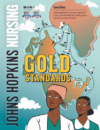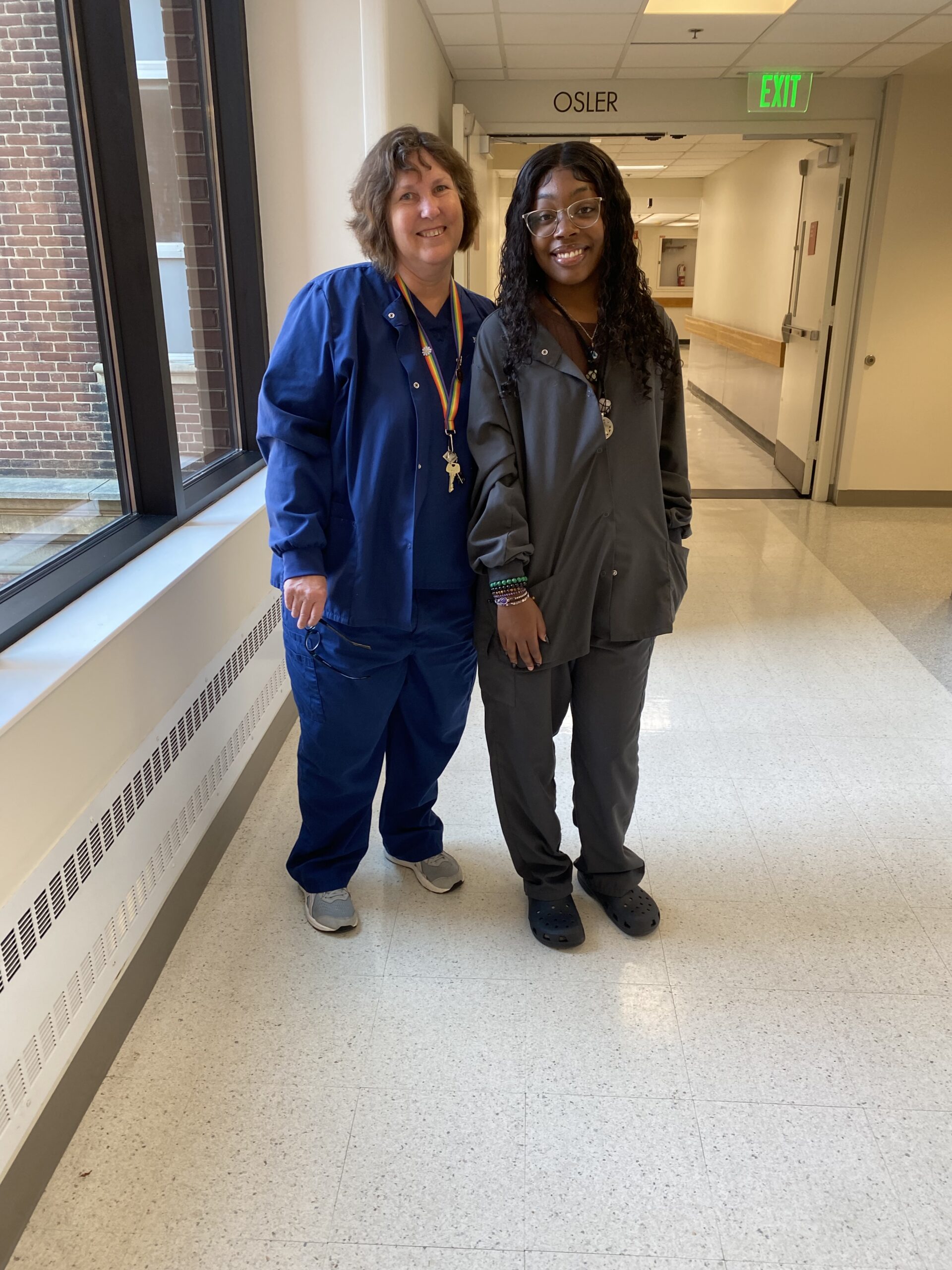Melinda Walker, lead clinical nurse for the Brain Stimulation Unit, with Shaleah Jackson, 17, a student at Mergathaler Vocational-Tech in East Baltimore. Walker considers mentoring a powerful antidote to burnout.
Melinda Walker, longtime lead clinical nurse for the Johns Hopkins Hospital Brain Stimulation Unit, says mentoring student interns does more than helping expose local high school and college students to potential medical careers. It can also change the lives of the nurses who mentor them.
“Yes, interns can be very helpful, saving you steps by fetching supplies or a warm blanket for a patient,” Walker says. “But it can also be incredibly inspiring to figure out how to explain what you do to someone with no medical background, to see the importance and excitement of what you have been doing for years through a young person’s eyes.”
This kind of mentoring, Walker believes, can be a powerful antidote to nursing burnout.
Walker experienced those benefits firsthand last summer, when she agreed to mentor two Baltimore City high school students who came to her through the Johns Hopkins Summer Jobs Program in collaboration with Baltimore City’s YouthWorks career program. “On their first day, their eyes were as big as saucers,” she says. “Everything was new to them, and probably a little intimidating.”
Shaleah Jackson, a 17-year-old rising senior at Mergenthaler Vocational-Technical High School (Mervo) in East Baltimore, completed the entire six-week paid internship and says it was life-changing.
“It was my first internship and my first job and it opened my eyes to career possibilities I never knew existed,” she says. “It was incredibly exciting. Melinda is a great teacher—patient, passionate, compassionate. I felt so lucky.”
Jackson, who will be certified as a pharmacy technician when she graduates from Mervo, is looking at colleges, hopes to work at Johns Hopkins again next summer, and is even considering further pursuing nursing.
“You give young people an opportunity to see what you do and whether it’s something they’d like to someday do themselves. And it also has the potential to help us feel more positive and engaged, to restore that joy. I’d like to see other nurses have that experience.”
Walker had the satisfaction of watching Jackson grow increasingly comfortable with clinical protocols and with the severely depressed patients who are treated with ECT (electroconvulsive therapy) on her unit. “Shaleah has a great sense of humor, is incredibly vibrant, quick to learn, enthusiastic about everything, and just a lot of fun to work with,” Walker says.
The mentoring experience was so meaningful that Walker was inspired to help supercharge the internship program. She’d like to see a formal orientation established for new interns who join nursing units, including touring the hospital, meeting nursing leaders, and learning exactly what will be expected of them in their new role. And she’d like to see more nurses participate. “I think nurses would love having interns if we could make it easier by giving them a standardized tool laying out potential roles these young people could perform on their units,” she says.
Walker is a big fan of the Wheel, Johns Hopkins Hospital’s innovative nursing governance structure that allows nurses and their colleagues to submit ideas to a series of nursing councils that pass on the best or most viable to nursing leadership. So Walker—who served three years on her department’s professional practice council when the Wheel was first being developed—wrote up a proposal for her orientation idea for interns, along with a standardized tool nurses could use to engage them. It was received so enthusiastically that nursing leadership quickly circled back to express interest in pursuing it. “Serving on the committee really helped inform my understanding of how change occurs in a big system like ours,” Walker says.
To help advance the project, she developed a detailed list of potential roles for interns based on her own department’s needs, from restocking supplies to welcoming patients and families with blankets, snacks, and hospitality. But she sees that list expanding as other units get involved.
“As nurses, we are so focused on getting through the day. Over time, it can take some of the joy out of the job. So this is a twofer,” says Walker. “You give young people an opportunity to see what you do and whether it’s something they’d like to someday do themselves. And it also has the potential to help us feel more positive and engaged, to restore that joy. I’d like to see other nurses have that experience.”

